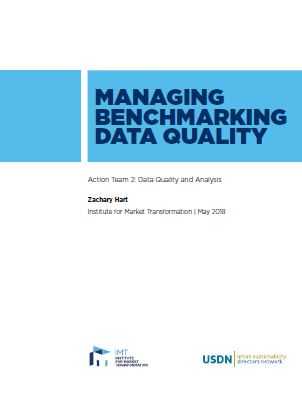Energy benchmarking data is meant to help real estate market actors factor energy and water efficiency into the transactional and management decisions they make about properties. Jurisdictions are already using this data to design additional policies and programs to improve energy efficiency and inform long-term climate planning. Benchmarking data can also be used by utilities to improve the marketing and design of their energy efficiency programs and by researchers to study the impact of energy efficiency policies and programs on building energy consumption.
For all of the above uses for benchmarking data, it is critical for each city managing a benchmarking and transparency ordinance to carefully consider the accuracy and reliability of the data it generates and publishes. Managing Benchmarking Data Quality was written to help benchmarking policy implementers understand current best practices for managing data gathered from ordinances in states, counties, and cities across the U.S. Sections 1–2 of this guide help benchmarking policy implementers understand strategies they can use to improve the quality of the benchmarking data they collect and to prepare that data for publication and analysis.
The report draws from works published by jurisdictions that are currently implementing benchmarking ordinances, academic publications, and interviews and discussions with members of the Urban Sustainability Directors Network(USDN) Benchmarking and Energy Data Collective Action Group.
Those implementing a benchmarking policy or program are highly encouraged to read these related IMT and USDN reports:
- Sharing Data to Motivate Action, which covers the latest techniques for developing energy benchmarking scorecards, also called energy benchmarking profiles, to present energy data to building owners as actionable information to encourage investment in efficiency.
- Analyzing Benchmarking Data, which looks at the types of analysis that jurisdictions with benchmarking laws have used to extract valuable information from the benchmarking data.
